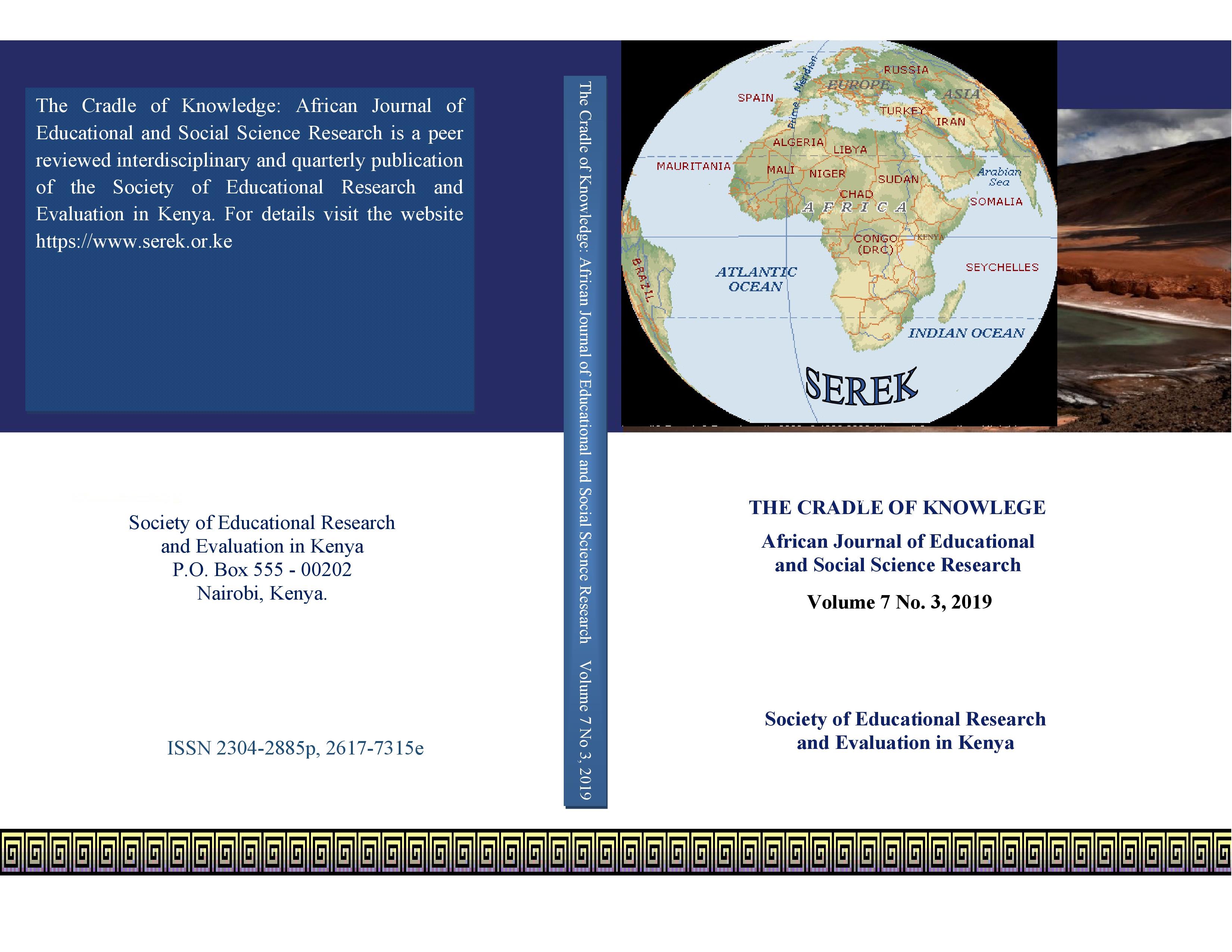
Exploring Utilization of Instructional Materials among Public Lower Primary Schools in Four Selected Counties in Kenya
Abstract
Instructional materials have remained important in enhancing quality education and are associated with student learning. Yet little is known about how teachers use instructional materials to help pupils learn. Utilization of instructional materials to enable pupils’ master literacy and numeracy in competitive global economy needs to be rethought. This paper examines utilization of instructional materials as a strategy to improve pupil’s literacy and numeracy skills among public lower primary schools in Kenya. The study used cross sectional survey design. Study was carried out in four selected Counties in Kenya: Kitui, Muranga,Narok and Migori. A sample of 68 head teachers and 68 teachers were selected using probabiliy sampling procedures. Four instruments were utilized: interview schedule, questionnaire, classroom observation schedule and a checklist. The results show adequacy of instructional materials and pupil textbook ratio vary across the public schools. Teacher’s use of instructional materials improved pupil’s literacy and numeracy skills through lesson preparation and giving exercises. The study recommends the need to provide adequate instructional materials.
Key words: Primary Education, Utilization, Instructional Materials, Literacy Skills, Numeracy Skills.Full Text:
PDFReferences
Archer,D.(2012).Children in school is not enough-they must learn something there. Gurdian Global development. Islamabad.
Fredriksen,B.Brar,S.Trucano,M(2015). Getting textbooks to every child in Sub Saharan Africa. Strategies for addressing the high cost and low availability problem. Washington C. International Bank For Reconstruction And Development/The World bank.
GCE (2015).Global Campaign For Education United States Chapter.(2015). Total reach, total learning: education beyond 2015. Washington,D.C. Available from www.gce.us.org
Greaney,V.(1998). Review. Promoting reading in developing countries: Views on making reading materials accessible to increase literacy levels. Newark,DE: International reading association,214pp
Jeanne, M. (1994). How to teachers use textbooks and other print materials? A review of the literature.
Jamieson, R. and Byrne, C. (2008).Primary teachers’ belief about the use of mathematics textbooks. Brisbane. Australia
Leyendecker, R. (2008). Curricula, examinations and assessments in secondary education in Sub Saharan Africa. Washington, D, C: World Bank.
Lockheed, M.E. and Verspoor, A. M. (1991). Improving primary education in developing countries. World Bank: Oxford University Press.
Postlethwaite, T.N.(2004). Monitoring educational achievement. UNESCO: International Institute for Education Planning.
Republic of Kenya (2005). Kenya education sector support programme. Delivering quality education and training to all Kenyans. Nairobi: Government Printer.
……. (2002). Primary education syllabus. Volume two. Nairobi: Government Printer.
……. (2002). Primary education syllabus. Volume one. Nairobi: Government Printer.
Talbot,Z.(2015).Equitable learning for all in the post -2015 development agenda. Available from www.savethechildren.org
Tufeckcic,A.(2010).Basic determinants of producing a modern textbook.
UNESCO, (2014). Teaching and learning: Achieving quality for all. UNESCO: Oxford University Press.
……….(2010). EFA global monitoring report. Reaching the marginalized. UNESCO: Oxford University Press.
UNESCO-UNICEF (2013). Making education a priority in the post -2015 development agenda. Report of the global thematic consultation on education in the post-2015 development agenda. The World We Want
Verspoor, A. and Wu, K.B.(1990).Textbook and Educational Development. Document no.PHREE/90/31. World Bank.
Verspoor, A.M. (2005). The Challenge of learning: Improving the quality of basic education in Sub-Saharan Africa. Association for the Development of Education in Africa. International Institute for Educational Planning
World Bank.(2003). Lifelong Learning in the Global Knowledge Economy: Challenges for Developing Coutries.WorldBank Report. Washington, D, C.
Refbacks
- There are currently no refbacks.
License URL: https://www.serek.or.ke
SEREK publication https://serek.or.ke
This work is licensed under a Creative Commons Attribution 4.0 International License